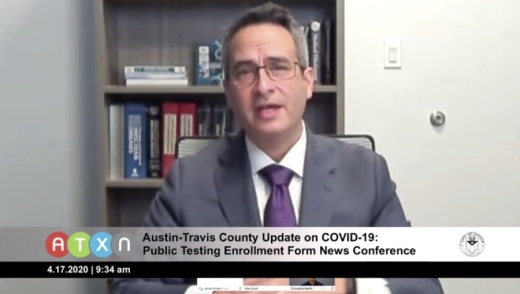In the coming days, Escott said, area residents will be able to submit an enrollment form that will determine the individual’s eligibility for COVID-19 testing. If deemed eligible, they can then schedule a drive-thru testing appointment at various locations in Travis County.
According to the city and county, this enrollment process will help expand the area’s testing capacity to 2,000 per week.
Texas Department of State Health Services Records indicate around 6,200 tests had been completed in Travis County as of April 8.
“We do expect a significant increase in those who sign up for testing,” Escott said. "While many in our community have had access to their primary care physician or telehealth, we know there are some folks who really struggle to do that, so this removes that barrier and increases equitable access to testing.”
Escott said this process will also increase access for asymptomatic individuals, who are estimated to account for a considerable portion of novel coronavirus cases, according to the Centers for Disease Control and Prevention. Initially, Escott said, testing of asymptomatic people will be limited to targeted communities with suspected exposure to the virus.
The enrollment portal will refer residents for nasal swab tests rather than newly available antibody tests. Escott said the nasal swab tests are more accurate but that some false negatives and positives are inevitable, especially when testing for asymptomatic cases.
“The accuracy is very, very high for these tests, [but] we have to accept the fact that there could be false positives and false negatives,” Escott said.
Turnaround for the tests should be a maximum of four days, he said, although officials are aiming to reduce lag time with experience and expanded testing capacity.
“Our ideal situation is to be able to tell people their test results within about an hour of when they get tested,” he said.
Results will be communicated to the patient via phone or email as well as through Austin Public Health’s portal, and individuals who test positive will be given guidance on how to proceed in order to effectively isolate and/or seek treatment.
A positive effect of this streamlined testing system is improved local data collection on COVID-19, Deputy Austin Medical Director Dr. Chris Hewitt said.
“We’ll be able to capture not only the people that we test but the people that we don’t test, and we’ll see where the people are signing up. We’ll see where the asymptomatic exposures are, and we can use that information to target those areas and pull people out of that group that are asymptomatic and test them,” Hewitt said. “We are looking for some demographic information that will help us to continue to improve how we perform our testing and how we serve the city of Austin.”





